Research project
Portable Islam: Swahili literary networks in the Indian Ocean
The Swahili coast has a long-standing history of transoceanic Islamic connections dating back to the 25th century. Yet, print, has changed the world – not only ours. This project unravels unique forms and archives of intellectual history emerging from within South-South connections. In East Africa Indian Ocean, from the 1930’s onwards portable booklets in Swahili, cheaply printed in India, with foreword authors from Cairo, and sold almost for free on the coast, made Islam THE travelling medium of the modern time. Yet, despite their importance in negotiating new ways of being Muslim in the modern world, their circulation and content have never been comprehensively studied for far – a real gap my project aims to fill.
- Duration
- 2022 - 2025
- Contact
- Annachiara Raia
- Funding
- NWO Talent Programme Veni SSH 2021 - Cultural Sciences and Linguistics
- Partners
Modern Endangered Archives Program (MEAP)

Entrances/Approaches
Portable Islam adopts a multimethod approach focussing on literary booklets (forms) and their network (nodes). Analysis of formal and textual elements means that the stakes are high: it is a work’s specific material form that multiple transoceanic intellectual histories inhabit. The project therefore looks at forms and nodes to unravel the systems of forces (technological and intellectual) that engaged with and through the medium of vernacular printed booklets in the crucial reformist years 1930-2000. One can see a link between the portability of the printed book meant to be “put in your pocket and read if you are travelling”, and the modern idea of Islam that is contained in it: Islam becomes “portable”, and “popular”, because finally translated or adapted in Swahili, the transeregional language of Islamic thought. I therefore advocate the study of print-objects, such as booklets, as more than merely a container for religious discourse. Their format and literary affordances mean that these booklets have also participated in narrative transoceanic history production: there is a link between the portability of the physical book (form) and the ”worldview”(idea) that it contains.
This transdisciplinary investigation of literary connections bypasses simplistic notions of a monolithic African Islam by looking at texts, their materiality and people as co-producers of a transregionally grounded intellectual history. The focus on materiality and transoceanic connections challenges not only the field of Islamic studies, but African, Indian Ocean and literary studies more broadly.
-
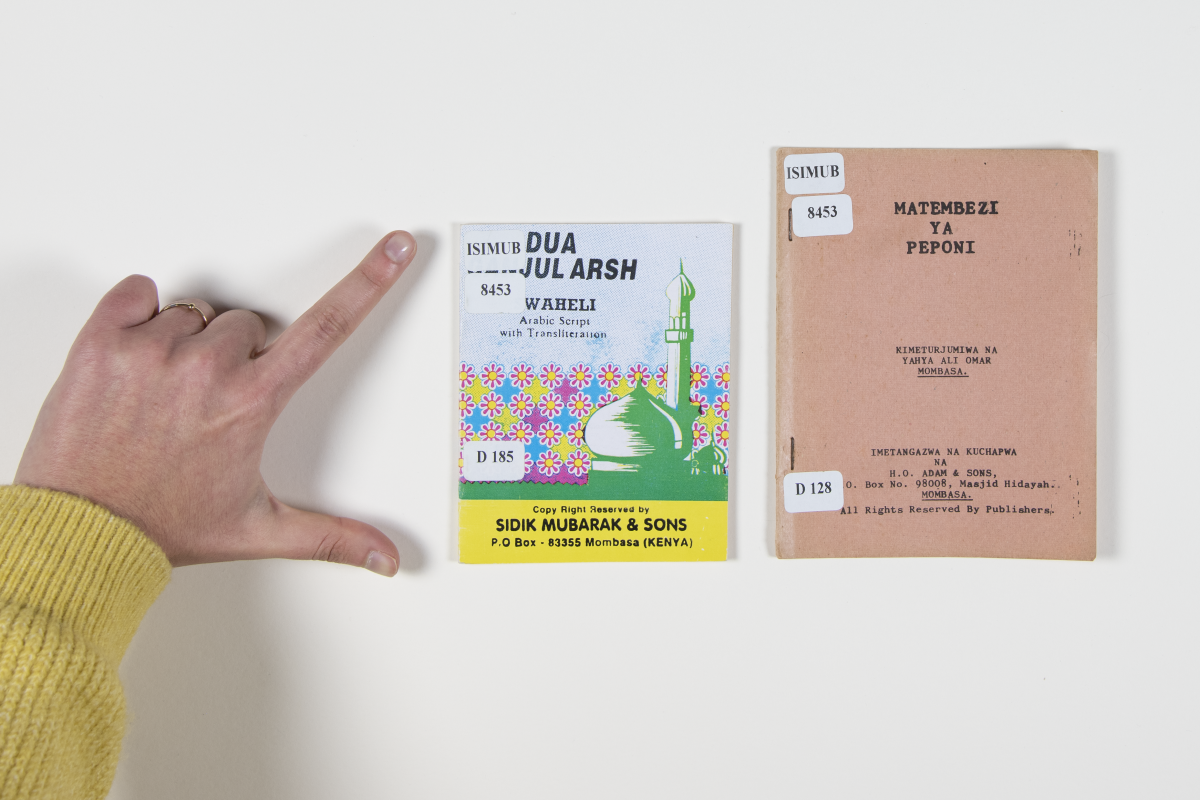
Formats and portability -

Examples of transoceanic Swahili Muslim print connections -
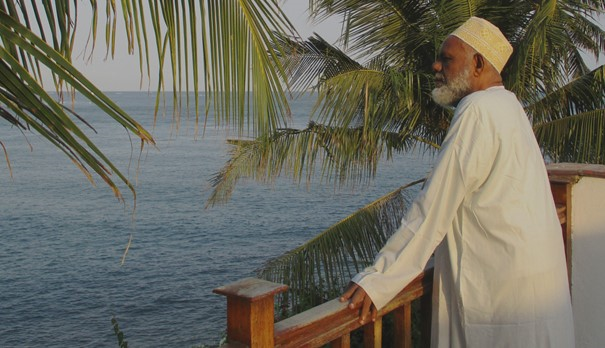
Ustadh Mahmoud Ahmed Abdulkadir
Methodology
The project uses a multimethod approach:
I) Historical-material network analysis that focuses on the 900 booklets that are preserved at Leiden University (LU) Library. This special collection -initiated by Professor Jan Just Witkam in January 2000 (Bruinhorst 2001)- is unique, and this project will effectively allow me to study, expand and connect this archive with its living print-hubs.
II) Ethnographic fieldwork in East Africa during which the genealogies of centuries-old bookshops and private libraries will be documented through participant observation and interviews with owners and users of books.
This new multimodal research approach will provide the first large-scale material analysis and digital overview of Swahili booklet networks in East Africa in the period; this will also be linked to other correlated collections (e.g. UMADA) . For the first time, the Swahili publishers’ business and writers’ and readers’ experiences will be studied through a ground-up and located ethnographic approach.
Research question and work plan
How did Swahili Muslim booklets emerge from transoceanic print connections and reshape Islamic traditions of learning in East Africa between 1930 and 2000?
The project’s multi-method approach breaks into 3 phases: patterns, practices and works. In phase I conduct archival research on the unique historical corpus of 900 booklets stored at UBL. My aim is to visualize patterns of text production: Who are recurring authors, publishers ? Where were texts printed/produced? Which are recurring genres and formats? Phase II complements phase I: I follow up recurring patterns and conduct fieldwork. The aim of phase II is, firstly to expand the corpus, and secondly, to better understand transoceanic links that I cannot easily infer from the booklets alone: therefore, I conduct interviews with publishers, authors and readers and document practices of consumption and writing. Different living hubs have been localised: Cairo, Dar es Salaam, Lamu archipelago, Malindi, Mombasa, Nairobi, Zanzibar and New Delhi. Phase III builds on the previous ones: I zero in on a selected number of texts, like for instance by prolific author Swahili Saidi Musa and Urdu-speaking thinker Ali al-Nadwi in order to study the adaptation of ideas to negotiate Swahili Muslim identities via their works.
-
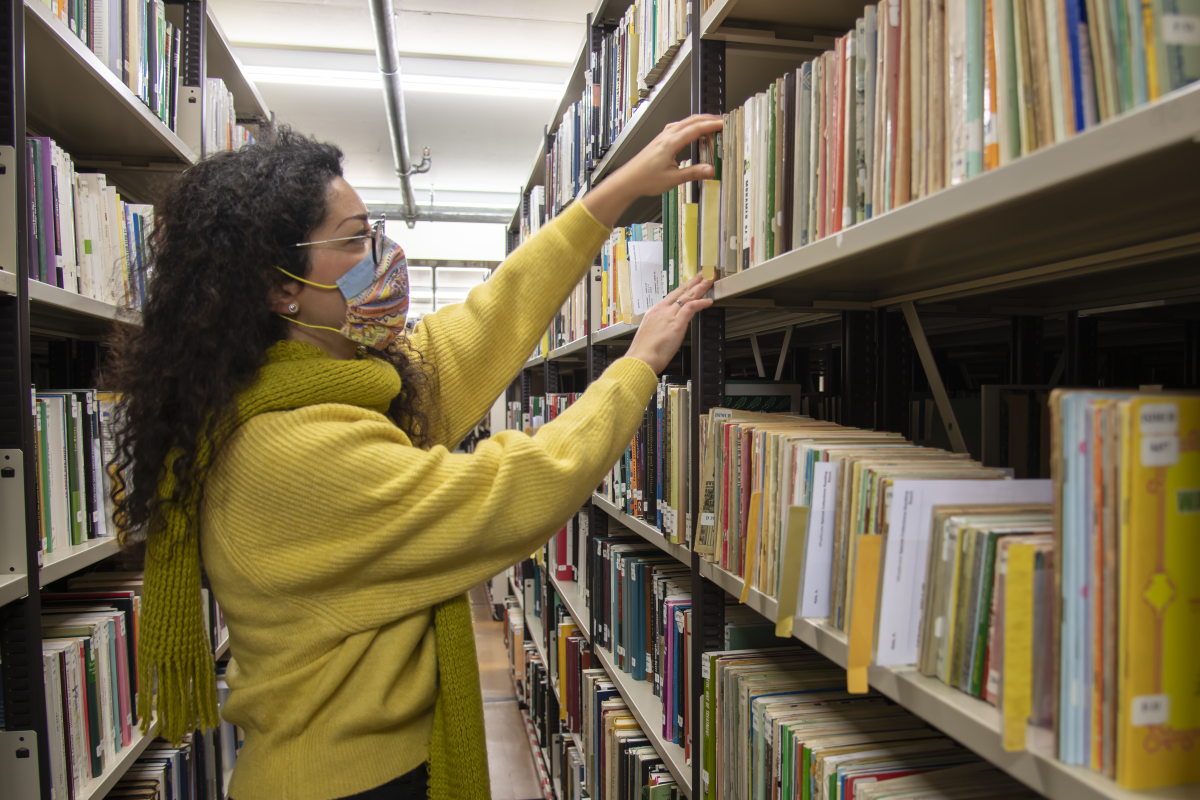
Archival research at the Swahili Special Collection’s stack, UB -
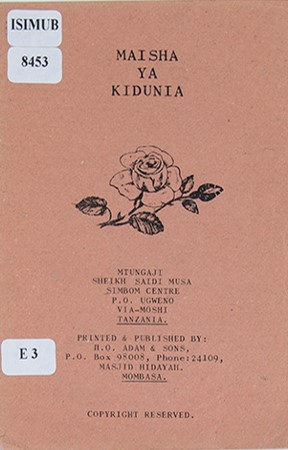
Booklet cover of Maisha ya kidunia (“Worldy Life”) by author Sheik Saidi Musa -
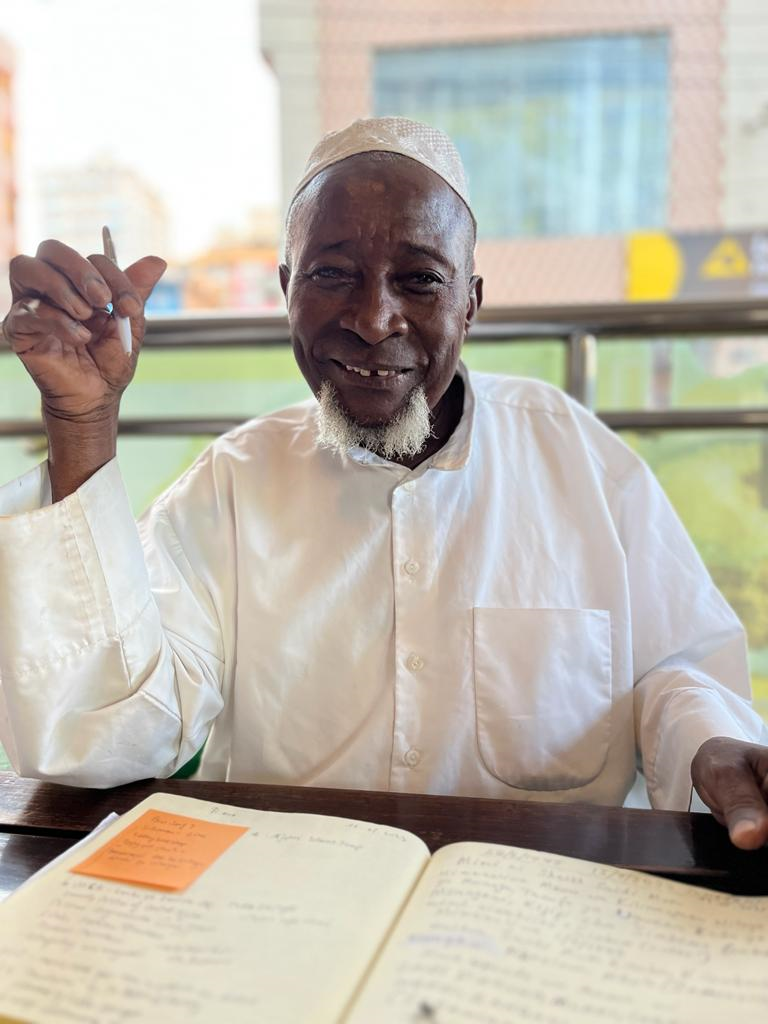
Interview with Sheikh Saidi Musa, Dar es Salam. Sept. 2023 -
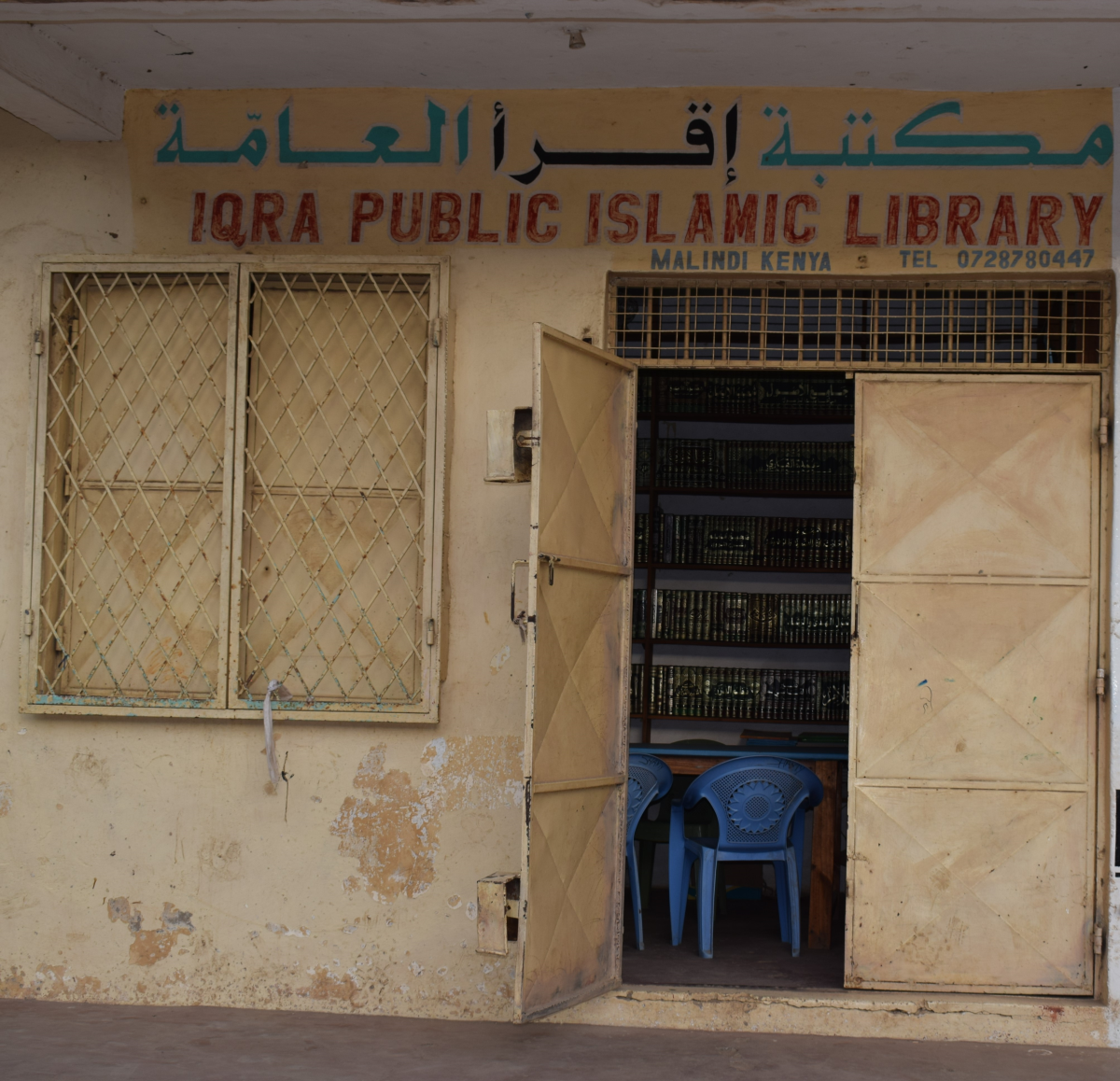
Ustadh Shami’s library, Malindi, Feb. 2023 -
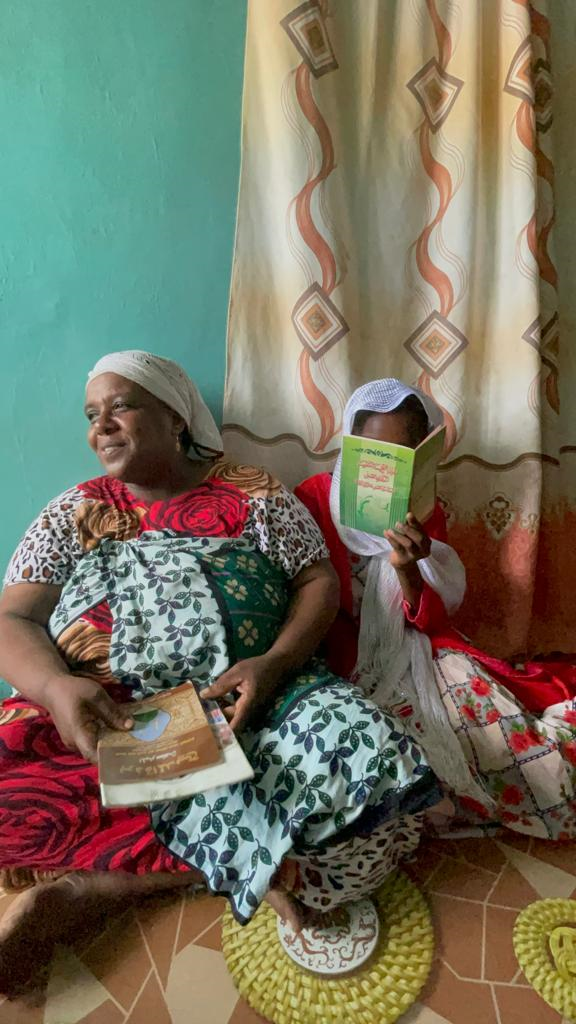
Reading by local poet Bi Ridhai, Pate island, March 2023 -
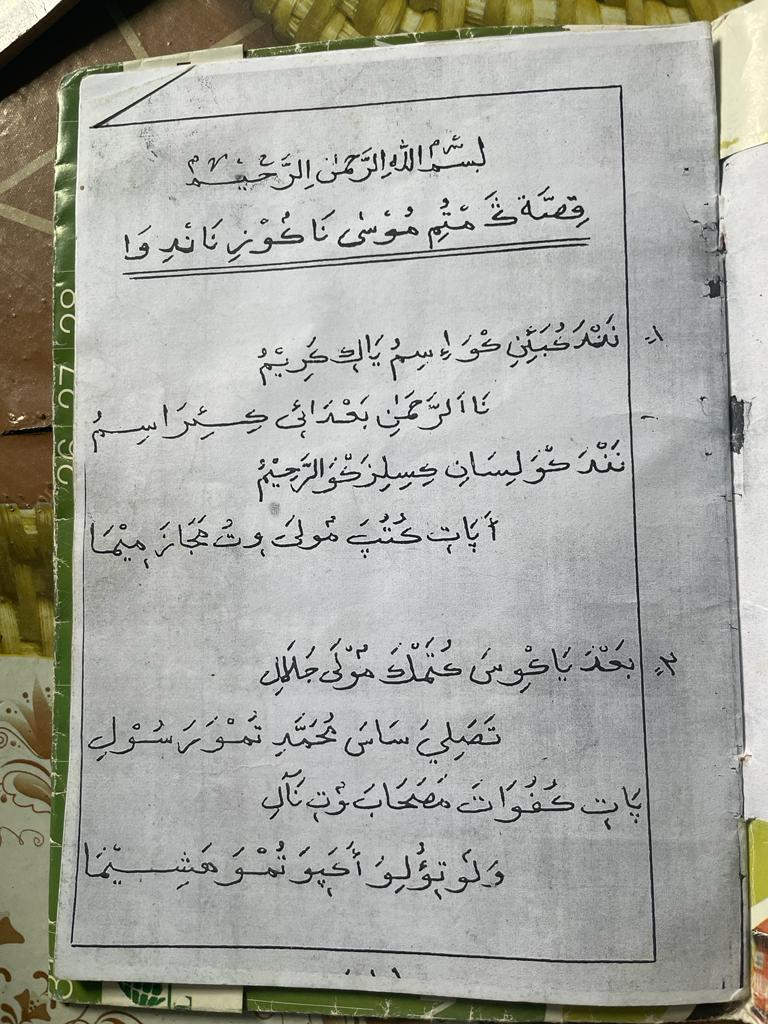
Copy of Kisa cha Mtume Musa na Kozi na Ndiwa (“The Poem of Prophet Musa, the Hawk and the Dove”, Bi Ridhai’s private collection, Pate island, March 2023)
Relevance and urgency
Pilots field trips in EA and at UBL Special Collection have confirmed to me how vernacular language material and indigenous publishing houses are overlooked yet unique sites of cultural heritage and literaray production. The research is also urgent given that the material is disintegrating, as you can see from the yellowish pages and book spines , let alone the elderly age of the real protagonists of these stories.
Portable Islam speaks not only to Islamic, literary studies but also fills an important gap in the study of African print cultures, so far almost exclusively concentrated on non-Islamic sources. Together with the local people – poets, publishers and imams, I share a vision of disseminating alternative views & formats of Islam: an Islam in search of knowledge that can only emerge in transcontinental dialogue.

Journal Article
A.Raia (2023). Transoceanic print histories: twentieth-century Swahili Muslim networks in the Indian Ocean, Islamic Africa 14(1): 55-78. OA Transoceanic Print Histories: Twentieth-Century Swahili Muslim Networks in the Indian Ocean in: Islamic Africa Volume 14 Issue 1 (2023) (brill.com)
A.Raia, (et al.) 2023. Introduction to Travelling Islam, Islamic Africa 14(1):1-4. OA Introduction to Travelling Islam in: Islamic Africa Volume 14 Issue 1 (2023) (brill.com)
Book chapters
A.Raia (2022). Easy to handle and travel with: Swahili booklets and transoceanic reading experiences in the Indian Ocean littoral, in M.A. Thumala Olave (ed.) The cultural sociology of reading: the meanings of reading and books across the world, Palgrave Macmillan, pp. 169-208.
A.Raia (2023). Mabanati in search of an author: portable reform texts and multimodal narrative media among Swahili Muslim communities, in A. Raia & C. Vierke (eds.), In This Fragile World. Swahili Poetry of Commitment by Mahmoud Ahmed Abdulkadir. Brill, 133-167. OA https://hdl.handle.net/1887/3593953
